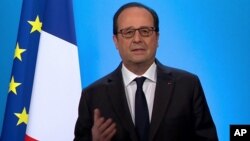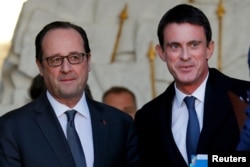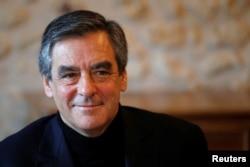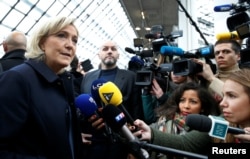President Francois Hollande's decision not to run for a second term may not change the outcome of French elections, analysts say, but it reflects a broader populist backlash that is upending politics in Europe and the United States.
Hollande headed to Abu Dhabi Friday, hours after his announcement that he would not seek another term. The Socialist leader becomes the first president in modern French history not to run for re-election, but he also faces record unpopularity, with approval ratings recently dipping to 4 percent.
"In the months to come, my only duty will be to continue to lead my country," Hollande said in a hastily scheduled televised address Thursday night, in which he did not endorse a leftist successor.
“Very different times”
All eyes are now on Prime Minister Manuel Valls, who is widely expected to announce a run in the coming days. Valls, however, is saddled with the same political legacy as Hollande, making his own presidential prospects uncertain.
BFM TV, a 24-hour rolling news and weather channel based in France, described Hollande as handing his prime minister a "poisoned present."
The shakeup in France may be replicated elsewhere in Europe, most immediately in Italy, where Prime Minister Matteo Renzi faces a key referendum on Sunday. In the Netherlands, far-right leader Geert Wilders is polling strongly ahead of the 2017 elections, and even German Chancellor Angela Merkel may face a tough re-election bid next year.
"We're moving to new times, and very different times," said Philippe Moreau Defarges of the Paris-based Institute of International Relations. "Like the last 1920's and 30's, something is changing, and it means we are going to have new leaders."
Decision is welcomed
Closer to home, Hollande's departure may reflect the start of a difficult political chapter, said analyst Bruno Cautres of the Centre for Political Research at Sciences Po, a university in Paris.
"We see a whole series of tensions that are putting pressure on French democracy and on the Fifth Republic," he said of a political system founded in 1958. "Citizens no longer believe in political promises. There's something that is broken in our democracy."
Across the political spectrum, many saluted Hollande's announcement as "courageous" and "dignified." Some 80 percent of French also back it, according to a Harris poll Friday.
Fillon next in line?
Former Prime Minister Francois Fillon, who won the conservative primaries and may well be the nation's next president, said Hollande was "lucid in admitting his defeat," while describing his term in office as ending in "political turmoil and creeping rot."
Far-right National Front candidate Marine Le Pen said it "marked a very heavy political failure."
Hollande has steered his country during particularly tumultuous times marked by three major terrorist attacks in France and upheaval in the Middle East and Africa. He struggled to shake his image as an indecisive leader and deliver on promises to grow the economy and jobs — although he said Thursday that was happening, albeit more slowly than he would have liked.
Socialist primaries in January
Several ministers left his Cabinet, and two of them entered the presidential race. Additionally, a recently published, tell-all book recounted deeply controversial remarks he made about Islam, immigration and even the judicial system.
Hollande's departure, however, may not boost the chances of his deeply divided leftist party.
"For some, Francois Hollande failed because he wasn't enough to the left, and Manuel Valls will face the same criticism," if he runs, analyst Cautres said. "For others, economic capitalism is the only solution."
These battling tendencies will likely play out in next month's Socialist primaries, which could pit centrist-minded Valls against much more leftist ex-economy minister Arnaud Montebourg.
"Manuel Valls' gamble will try to synthesize these two tendencies, which is no longer possible," said political researcher Etienne Schweisguth, of Sciences Po.
There are other unknowns, including what happens to another ex-minister and independent candidate Emmanuel Macron, who is coasting on his outsider status.
Runoff elections in May
As things stand now, many analysts believe French runoff elections next May will pit conservative Fillon against far-right leader Le Pen.
Fillon has strong backing from his center-right party; but, so far, he has failed to win over disgruntled working class voters who still back the far-right.
Even so, most experts still discard the chances of an electoral upset similar to U.S. President-elect Donald Trump's.
"In every case when the extreme right had a chance of winning, we saw a large mobilization voting against the National Front," analyst Schweisguth said. "But this situation of protest and discontent is going to last. Whether it grows or not is difficult to say."










